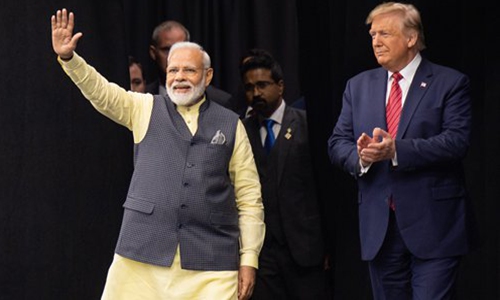HOME >> WORLD
Concerns remain amid Trump’s India visit
By Sun Haoran Source:Global Times Published: 2020/2/24 23:45:29 Last Updated: 2020/2/25 1:34:47

US President Donald Trump and Indian Prime Minister Narendra Modi attend "Howdy, Modi!" at NRG Stadium in Houston, Texas, September 22, 2019. Photo:VCG
Although the US and India may reach agreements in trade, defense, counter-terrorism, energy and technology, obstacles such as market protection and high tariffs still remain, experts said on Monday, while also urging India to take precautionary measures to prevent the outbreak of COVID-19 during US President Donald Trump's India visit.
Trump arrived in India on Monday to start his two-day visit to the South Asian country, during which the two sides will aim to reset relations deadlocked by trade disputes and strengthen their political and security ties, Reuters reported on Monday.
Indian Prime Minister Narendra Modi was present at the airport to welcome the US president, who was also accompanied by his wife Melania, daughter Ivanka, son-in-law Jared Kushner and top brass of his administration, said PTI on Monday.
"Trump is expected to sign a trade agreement with India as the latter is an important factor in the US deficit," Lan Jianxue, an expert on South Asia at the China Institute of International Studies, told the Global Times on Monday. "He hopes to reach an agreement with India on the Indo-Pacific strategy to contain China as well."
According to the Office of the United States Trade Representative, India is currently the US' 9th largest goods trading partner and the US goods and services trade deficit with India was $25.2 billion in 2018.
"Trump also intends to use this visit to draw support from people of Indian descent in the US for the coming presidential election," said Lan, adding that many Indians in the US hold important positions in the fields of social media, technology and software outsourcing, and have great influence and appeal in American society.
Despite the hospitality from the host country and the good atmosphere between the two leaders, the two largest democracies still have many obstacles in their relationship, such as the collision between Trump's "America First" slogan and Modi's "Make in India" movement, trade disputes, how to deal with China, and the Kashmir issue, AFP reported on Monday.
"The biggest problem is Indian market protection and high tariffs, particularly in Indian retail and agricultural products, such as dairy products and beef," said Lan.
"The US and India are likely to sign moderate agreements in the fields of arms trade, counter-terrorism, energy and technology, rather than any big deals," Qian Feng, a research fellow at the national strategy institute of Tsinghua University in Beijing, told the Global Times Monday.
Media reports predicted that Trump's first official visit to India would be a huge event for the South Asian country and that "many millions" would greet him.
According to a report by the BBC on Sunday, Trump is expected to address an audience of more than 100,000 people at an event aptly called "Namaste Trump" in Ahmedabad, one of the three cities he will visit.
Experts worry that rallies with a large number of people may increase the possibility of a COVID-19 outbreak in India, given the sharp rises in coronavirus infections in Japan, South Korea, Italy and Iran, where medical and health systems are better than in India.
Take South Korea for example: the number of confirmed cases of COVID-19 infections has risen from several dozen to several hundred in just a couple of days (763 case as of Monday), making it the highest outside China, apart from the Diamond Princess cruise ship in Japan.
"Although there are only several confirmed cases of COVID-19 infection, India should actively take precautionary measures, such as consolidating the management and control of personnel, and limiting the number of attendees to the rally, to prevent a possible outbreak caused by people gathering during Trump's visit," Qian warned.
Qian's idea was echoed by Lan. He noted that "at the same time, India should also strengthen cooperation with international organizations, such as the WHO, and with China in epidemic prevention and control, such as virus research, development of vaccines, and detection technology, because there are no borders for the coronavirus."
Posted in: AMERICAS,CENTRAL & SOUTH ASIA,WORLD FOCUS,EYE ON WORLD